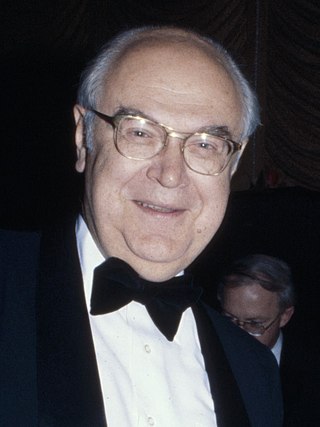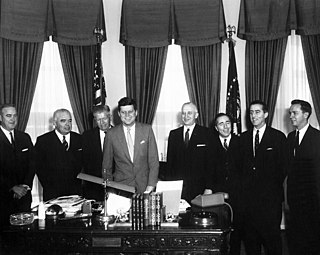Related Research Articles

Radio Free Europe/Radio Liberty (RFE/RL) is a United States government funded organization that broadcasts and reports news, information, and analysis to countries in Eastern Europe, Central Asia, Caucasus, and the Middle East where it says that "the free flow of information is either banned by government authorities or not fully developed". RFE/RL is a private, non-profit 501(c)(3) corporation supervised by the U.S. Agency for Global Media, an independent government agency overseeing all U.S. federal government international broadcasting services. Jeremy Bransten is acting editor-in-chief of RFE.

Jeane Duane Kirkpatrick was an American diplomat and political scientist who played a major role in the foreign policy of the Ronald Reagan administration. An ardent anticommunist, she was a longtime Democrat who became a neoconservative and switched to the Republican Party in 1985. After serving as Ronald Reagan's foreign policy adviser in his 1980 presidential campaign, she became the first woman to serve as United States Ambassador to the United Nations.

George Frost Kennan was an American diplomat and historian. He was best known as an advocate of a policy of containment of Soviet expansion during the Cold War. He lectured widely and wrote scholarly histories of the relations between the Soviet Union (USSR) and the United States. He was also one of the group of foreign policy elders known as "The Wise Men."

German–Soviet Union relations date to the aftermath of the First World War. The Treaty of Brest-Litovsk, dictated by Germany ended hostilities between Russia and Germany; it was signed on March 3, 1918. A few months later, the German ambassador to Moscow, Wilhelm von Mirbach, was shot dead by Russian Left Socialist-Revolutionaries in an attempt to incite a new war between Russia and Germany. The entire Soviet embassy under Adolph Joffe was deported from Germany on November 6, 1918, for their active support of the German Revolution. Karl Radek also illegally supported communist subversive activities in Weimar Germany in 1919.

Francis Dana was an American Founding Father, lawyer, jurist, and statesman from Massachusetts. He served as a delegate to the Continental Congress in 1777–1778 and 1784. A signer of the Articles of Confederation, he was secretary to the diplomatic mission that negotiated the end of the American Revolution, and was appointed Minister to Russia. He later served as a member of the Supreme Judicial Court of Massachusetts and served as the chief justice for 15 years.

Charles "Chip" Eustis Bohlen was an American diplomat, ambassador, and expert on the Soviet Union. He helped shape United States foreign policy during World War II and the Cold War and helped develop the Marshall Plan to rebuild Europe.

Anatoly Fyodorovich Dobrynin was a Soviet statesman, diplomat, and politician. He was the Soviet ambassador to the United States for more than two decades, from 1962 to 1986.

The Washington Report on Middle East Affairs magazine, published eight times per year, focuses on "news and analysis from and about the Middle East and U.S. policy in that region". The New York Times has characterized it as "critical of United States policies in the Middle East". In 2005, USA Today called it "a non-partisan publication that has been critical of Bush's policies". Representatives of pro-Israel organizations have criticized the Washington Report on Middle East Affairs as being aligned with the Arab lobby and as "anti-Israel".

Loy Wesley Henderson was a United States Foreign Service Officer and diplomat.

Jack Foust Matlock Jr. is an American former ambassador, career Foreign Service Officer, a teacher, a historian, and a linguist. He was a specialist in Soviet affairs during some of the most tumultuous years of the Cold War, and served as the U.S. Ambassador to the Soviet Union from 1987 to 1991.

Stanley Kuhl Hornbeck was an American professor and diplomat. A Rhodes scholar and the author of eight books, he had a thirty-year career in government service. He was chief of the State Department Division of Far Eastern Affairs (1928–1937), a special adviser to Secretary of State Cordell Hull (1937–1944), and ambassador to the Netherlands (1944–1947).

Soviet Union–United States relations were fully established in 1933 as the succeeding bilateral ties to those between the Russian Empire and the United States, which lasted from 1776 until 1917; they were also the predecessor to the current bilateral ties between the Russian Federation and the United States that began in 1992 after the end of the Cold War. The relationship between the Soviet Union and the United States was largely defined by mistrust and tense hostility. The invasion of the Soviet Union by Germany as well as the attack on the U.S. Pacific Fleet at Pearl Harbor by Imperial Japan marked the Soviet and American entries into World War II on the side of the Allies in June and December 1941, respectively. As the Soviet–American alliance against the Axis came to an end following the Allied victory in 1945, the first signs of post-war mistrust and hostility began to immediately appear between the two countries, as the Soviet Union militarily occupied Eastern European countries and turned them into satellite states, forming the Soviet Bloc. These bilateral tensions escalated into the Cold War, a decades-long period of tense hostile relations with short phases of détente that ended after the collapse of the Soviet Union and emergence of the present-day Russian Federation at the end of 1991.
Dr William Bain is a professor at the National University of Singapore, and previously senior lecturer at the University of Wales, Aberystwyth in the department of International Politics. He attended the University of South Carolina where he obtained a BA. He also attended University of British Columbia in Vancouver where he achieved an MA and PhD. Prior to joining UWA he lectured at University of Glasgow in international relations theory, international ethics, and eighteenth century political thought. He was previously a marine and served in the First Gulf War. He also has a beloved cat named Frankie.

James Franklin Collins is a former United States Ambassador to Russia. A career Foreign Service Officer in the State Department, he is a Russian specialist.

John Moore Allison was an American diplomat who served as the United States Ambassador to Japan from 1953 to 1957. From 1957 to 1958, he was Ambassador to Indonesia and from 1958 to 1960 to Czechoslovakia. In the 1960s and 1970s, he was a professor at the University of Hawaii.

The Molotov–Ribbentrop Pact was an August 23, 1939, agreement between the Soviet Union and Nazi Germany colloquially named after Soviet foreign minister Vyacheslav Molotov and German foreign minister Joachim von Ribbentrop. The treaty renounced warfare between the two countries. In addition to stipulations of non-aggression, the treaty included a secret protocol dividing several eastern European countries between the parties.
Raymond Arthur Hare was a United States diplomat who was Director General of the United States Foreign Service from 1954 to 1956 and Assistant Secretary of State for Near Eastern and South Asian Affairs from 1965 to 1966.

Bernard Anthony Gufler was a distinguished American diplomat and member of the United States Foreign Service. In a long career he served in many postings abroad, including Ambassador to Ceylon and Ambassador to Finland.

Mabel Murphy Smythe-Haith was an American diplomat who served as Ambassador for the United States to Cameroon and later Equatorial Guinea, as well as the Deputy Assistant Secretary of State for African Affairs.

The Cold War (1947–1948) is the period within the Cold War from the Truman Doctrine in 1947 to the incapacitation of the Allied Control Council in 1948. The Cold War emerged in Europe a few years after the successful US–USSR–UK coalition won World War II in Europe, and extended to 1989–91. It took place worldwide, but it had a partially different timing outside Europe. Some conflicts between the West and the USSR appeared earlier. In 1945–46 the US and UK strongly protested Soviet political takeover efforts in Eastern Europe and Iran, while the hunt for Soviet spies made the tensions more visible. However, historians emphasize the decisive break between the US–UK and the USSR came in 1947–48 over such issues as the Truman Doctrine, the Marshall Plan and the breakdown of cooperation in governing occupied Germany by the Allied Control Council. In 1947, Bernard Baruch, the multimillionaire financier and adviser to presidents from Woodrow Wilson to Harry S. Truman, coined the term "Cold War" to describe the increasingly chilly relations between three World War II Allies: the United States and British Empire together with the Soviet Union.
References
- ↑ Cathal J. Nolan, ed., Notable US Ambassadors Since 1775: A Biographical Dictionary (1997). pp 205-210.
- ↑ "Robert F. Kelley". Radio Liberty. Archived from the original on July 14, 2007. Retrieved 2008-05-05.